Webinar on Myanmar of Today: From Indian Persepectives
Myanmar since its independence had witnessed prolong military rule. The critical balance between the civil and the military leadership of Myanmar thus faced a severe crisis after the general election of November 2020 where the ruling party National League of Democracy registered an astounding victory defeating the pro military Union Solidarity Development party. The army disputed the results, claiming that the vote was fraudulent which according to some political expert was the driving force that led the military leadership to orchestrate a coup and to establish their firm grip on the political power of the country.
Institute of Social and Cultural Studies, India as a part of its multidisciplinary endeavor, organized on 3 February, 2021 a webinar comprising distinguished scholars on Myanmar to carry out an academic inquest to understand the implication of the recent military coup in determining the future of Indo- Myanmar relations and also shaping the security scenario of the Indo- Pacific region. This significant webinar was moderated by Ambassador Rajib Bhatia, Former Ambassador of India to Myanmar. He commenced his introductory deliberation by highlighting the significance of the present issue. Briefly narrating the political history of Myanmar he stressed the necessity to understand the plethora of internal and external dimensions that might had played a role in this military coup. Mr. Mohit Mutsuddhi, Research Associate, Delhi Policy Group in his presentation said that the slow and thoughtful transition of Myanmar towards democracy received a major setback after the country’s military leadership staged a sudden coup to remove the elected civilian government from power. In his address he presented a few probable reasons like the alleged electoral malpractices by the ruling National League for
Democracy(NLA), political aspiration of the Myanmar bythe powerful military chief Min Aung Hlaing behind the
current military action etc.
The speaker subsequently in his discourse analyzed the crucial dynamics of the Sino-Indian relations and how it was going to get shaped in the post coup scenario. According to the speaker India had close economic and military cooperation with Myanmar and hoped that it would pursue the policy which aimed towards a more stable and participatory order in this important south east Asian nation. Prof. Suraj Langpoklakpam, Associate Professor,
Department of Political Science and International Relations, Dhanamanjuri University, Imphal, Manipur during his deliberation not only discussed India- Myanmar relation from a general perspective but from the perceptive of
North East Indian region also . He also pointed out the close association between the two nations in the non alignment movement and the cordial relationship maintained by the successive military regimes of Myanmar. He urged that the Myanmar policy of the Indian government would not be seen from a mere security point of view and demanded a more inclusive policy by incorporating the demands and aspirations of the local north east Indian people. In the course of his discussion he not only pointed out the ever increasing Chinese influence in Myanmar but also revealed the uneasy relationship it had with the Myanmar’s civilian government and surmised a possible Chinese role behind the military coup. Since India had a close military and economic interest with Myanmar, he opined that India must take a pragmatic policy that suited their national interest .
Mr. Pratim Ranjan Bose, Researcher and Columnist confined his deliberation on the economic aspects of the Indo- Myanmar relation. He stated the significant investment made by India in Myanmar’s education, agriculture, pharmaceuticals and information technology sector. He opined that India must follow a pragmatic policy for maintaining a stable relation with the military regime of Myanmar that enjoyed significant dominance in the socio- political system of the country. He urged the Indian government for initiating a concessional trade agreement with Myanmar, fast tracking the bilateral border trade and finally increasing India’s presence in Myanmar economic spheres.
The moderator thereafter summed up the webinar stating that though India had not fully utilized its potentiality in the economic sphere of Myanmar, yet India was perusing a policy towards more close economic cooperation with its south east Asian neighbor. During the question answer session, important questions were raised .The questions were adequately answered by the distinguished speakers.The webinar ended with the vote of thanks from Shri Arindam Mukherjee, Director, Institute of Social and Cultural Studies, India.





